ERP System: Components, Benefits, Problems, and Selection Process
VerifiedAdded on 2023/06/16
|13
|4218
|264
AI Summary
This report discusses the concept of ERP, benefits of implementing ERP in business, typical components of ERP, main problems in implementing ERP, critical factors in implementing ERP, typical steps in a process of selecting ERP, cloud ERP software, and difference between cloud and in-premises ERP. It also recommends three BI software for implementing in the TR. The report is useful for students studying enterprise information systems.
Contribute Materials
Your contribution can guide someone’s learning journey. Share your
documents today.
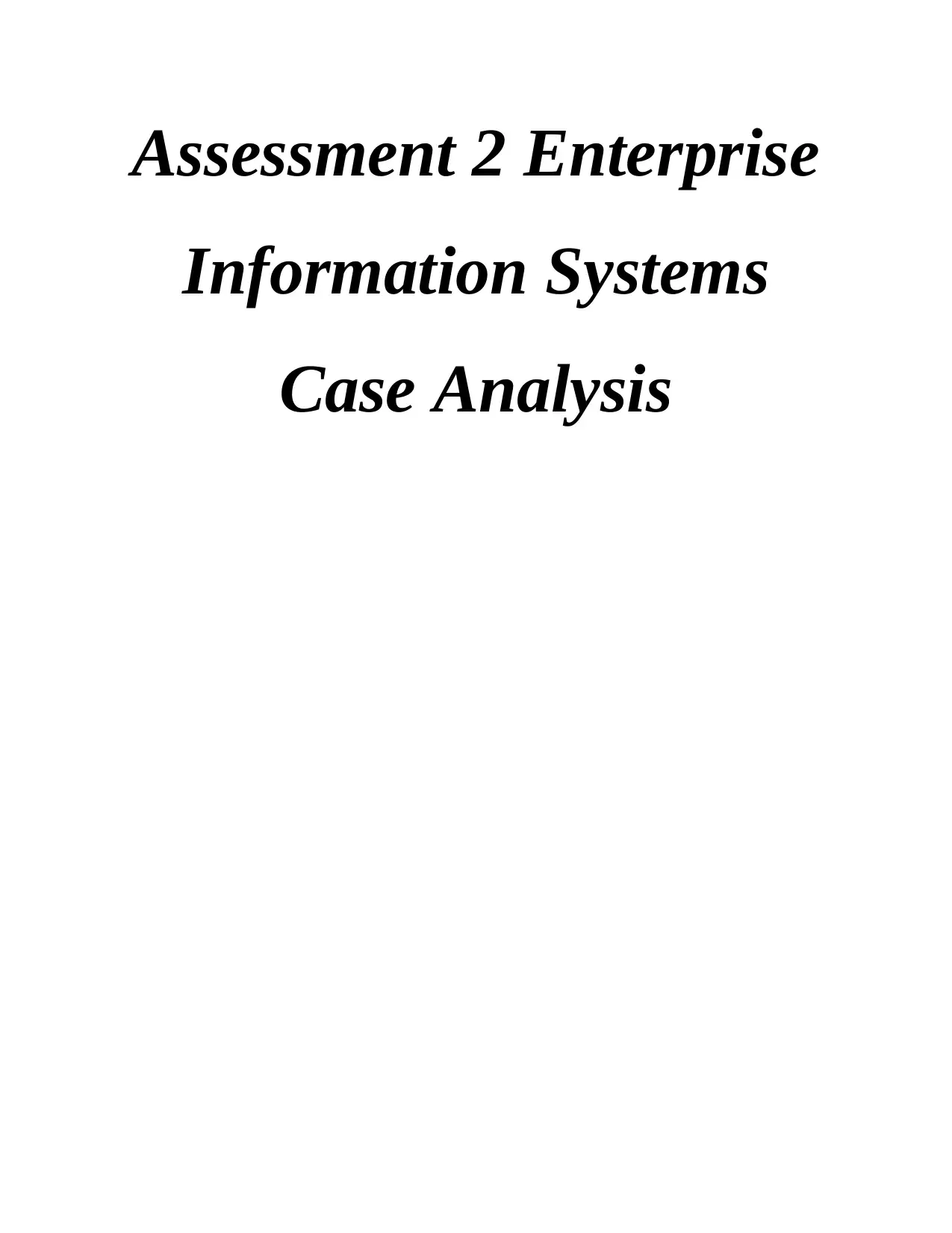
Assessment 2 Enterprise
Information Systems
Case Analysis
Information Systems
Case Analysis
Secure Best Marks with AI Grader
Need help grading? Try our AI Grader for instant feedback on your assignments.
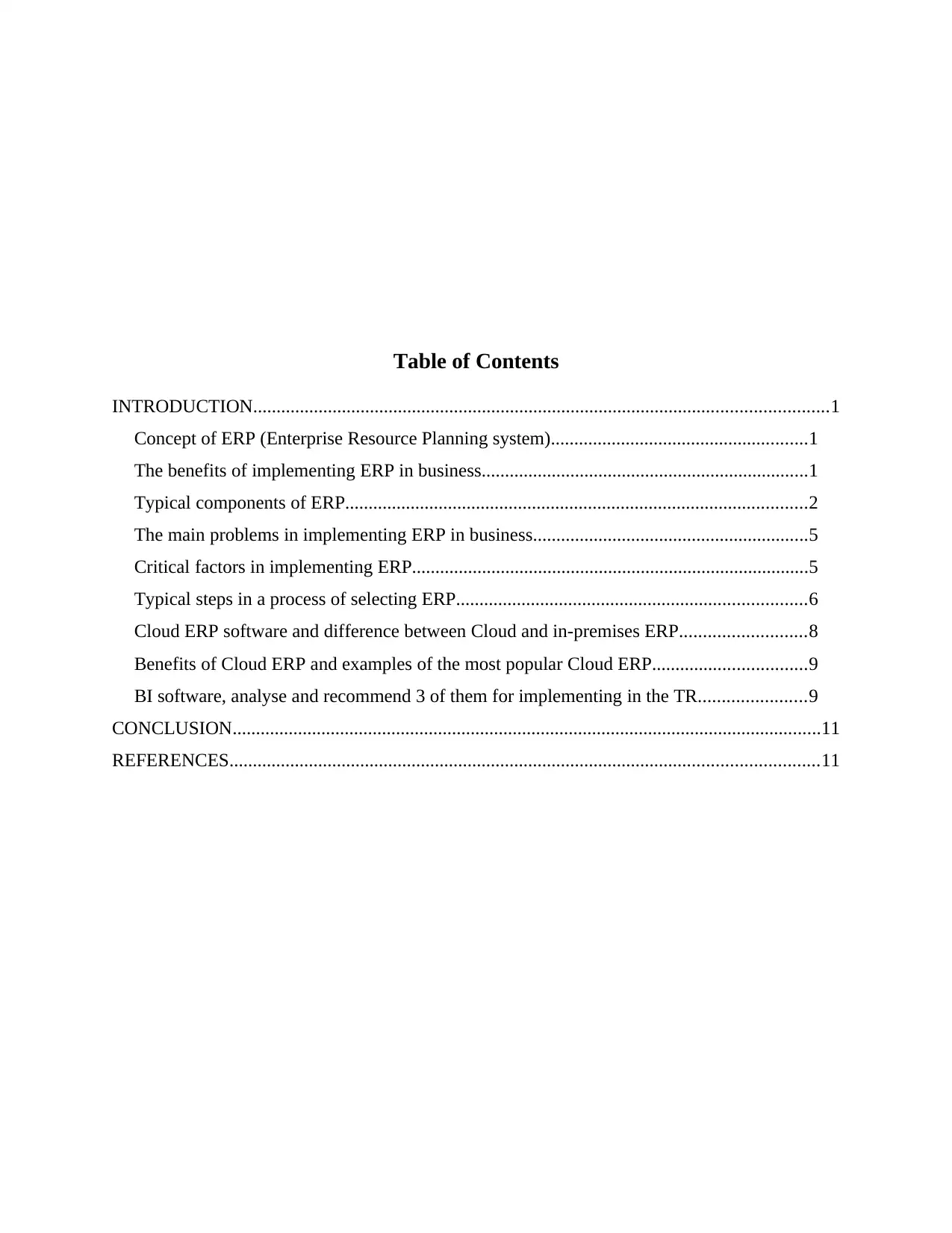
Table of Contents
INTRODUCTION...........................................................................................................................1
Concept of ERP (Enterprise Resource Planning system).......................................................1
The benefits of implementing ERP in business......................................................................1
Typical components of ERP...................................................................................................2
The main problems in implementing ERP in business...........................................................5
Critical factors in implementing ERP.....................................................................................5
Typical steps in a process of selecting ERP...........................................................................6
Cloud ERP software and difference between Cloud and in-premises ERP...........................8
Benefits of Cloud ERP and examples of the most popular Cloud ERP.................................9
BI software, analyse and recommend 3 of them for implementing in the TR.......................9
CONCLUSION..............................................................................................................................11
REFERENCES..............................................................................................................................11
INTRODUCTION...........................................................................................................................1
Concept of ERP (Enterprise Resource Planning system).......................................................1
The benefits of implementing ERP in business......................................................................1
Typical components of ERP...................................................................................................2
The main problems in implementing ERP in business...........................................................5
Critical factors in implementing ERP.....................................................................................5
Typical steps in a process of selecting ERP...........................................................................6
Cloud ERP software and difference between Cloud and in-premises ERP...........................8
Benefits of Cloud ERP and examples of the most popular Cloud ERP.................................9
BI software, analyse and recommend 3 of them for implementing in the TR.......................9
CONCLUSION..............................................................................................................................11
REFERENCES..............................................................................................................................11
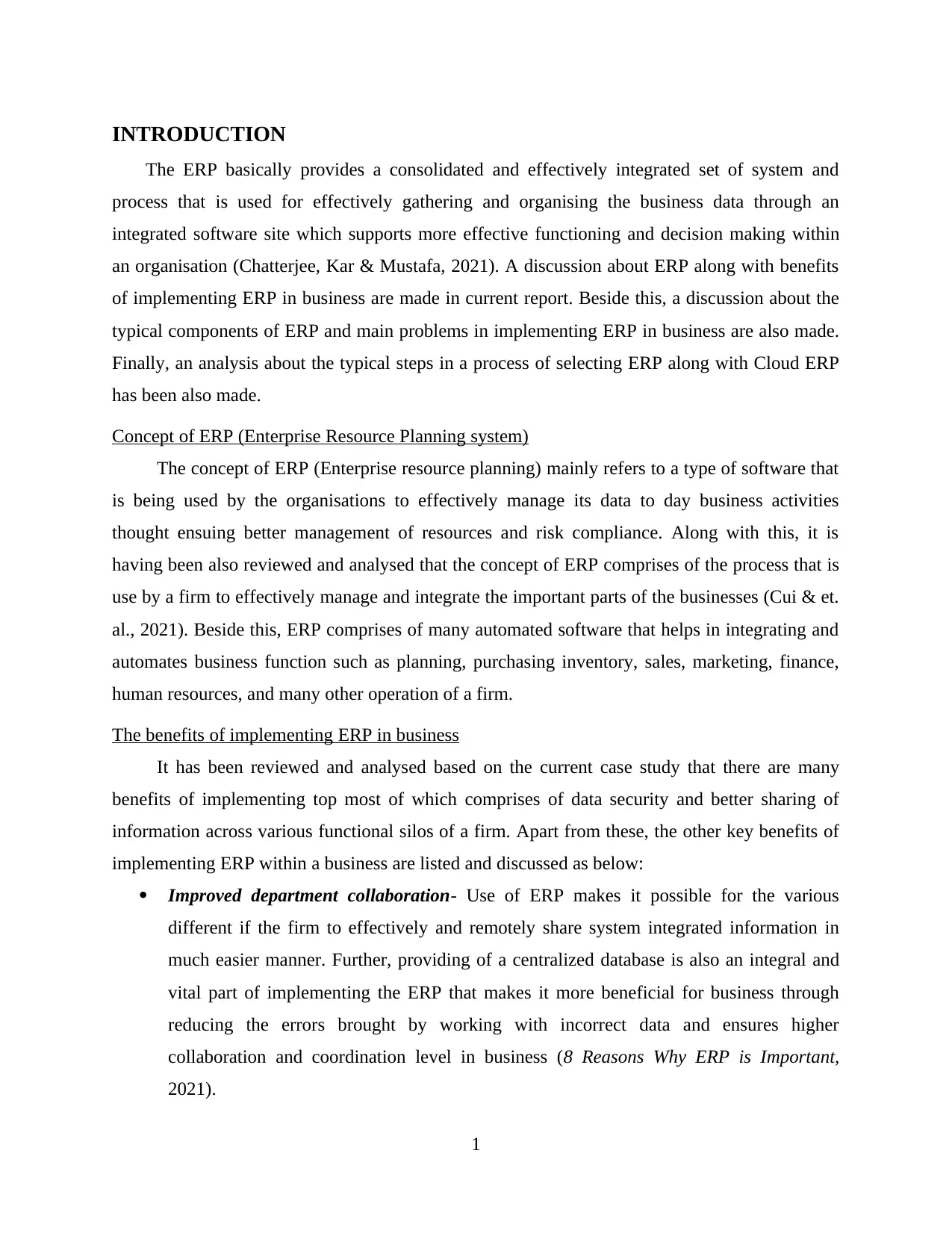
INTRODUCTION
The ERP basically provides a consolidated and effectively integrated set of system and
process that is used for effectively gathering and organising the business data through an
integrated software site which supports more effective functioning and decision making within
an organisation (Chatterjee, Kar & Mustafa, 2021). A discussion about ERP along with benefits
of implementing ERP in business are made in current report. Beside this, a discussion about the
typical components of ERP and main problems in implementing ERP in business are also made.
Finally, an analysis about the typical steps in a process of selecting ERP along with Cloud ERP
has been also made.
Concept of ERP (Enterprise Resource Planning system)
The concept of ERP (Enterprise resource planning) mainly refers to a type of software that
is being used by the organisations to effectively manage its data to day business activities
thought ensuing better management of resources and risk compliance. Along with this, it is
having been also reviewed and analysed that the concept of ERP comprises of the process that is
use by a firm to effectively manage and integrate the important parts of the businesses (Cui & et.
al., 2021). Beside this, ERP comprises of many automated software that helps in integrating and
automates business function such as planning, purchasing inventory, sales, marketing, finance,
human resources, and many other operation of a firm.
The benefits of implementing ERP in business
It has been reviewed and analysed based on the current case study that there are many
benefits of implementing top most of which comprises of data security and better sharing of
information across various functional silos of a firm. Apart from these, the other key benefits of
implementing ERP within a business are listed and discussed as below:
Improved department collaboration- Use of ERP makes it possible for the various
different if the firm to effectively and remotely share system integrated information in
much easier manner. Further, providing of a centralized database is also an integral and
vital part of implementing the ERP that makes it more beneficial for business through
reducing the errors brought by working with incorrect data and ensures higher
collaboration and coordination level in business (8 Reasons Why ERP is Important,
2021).
1
The ERP basically provides a consolidated and effectively integrated set of system and
process that is used for effectively gathering and organising the business data through an
integrated software site which supports more effective functioning and decision making within
an organisation (Chatterjee, Kar & Mustafa, 2021). A discussion about ERP along with benefits
of implementing ERP in business are made in current report. Beside this, a discussion about the
typical components of ERP and main problems in implementing ERP in business are also made.
Finally, an analysis about the typical steps in a process of selecting ERP along with Cloud ERP
has been also made.
Concept of ERP (Enterprise Resource Planning system)
The concept of ERP (Enterprise resource planning) mainly refers to a type of software that
is being used by the organisations to effectively manage its data to day business activities
thought ensuing better management of resources and risk compliance. Along with this, it is
having been also reviewed and analysed that the concept of ERP comprises of the process that is
use by a firm to effectively manage and integrate the important parts of the businesses (Cui & et.
al., 2021). Beside this, ERP comprises of many automated software that helps in integrating and
automates business function such as planning, purchasing inventory, sales, marketing, finance,
human resources, and many other operation of a firm.
The benefits of implementing ERP in business
It has been reviewed and analysed based on the current case study that there are many
benefits of implementing top most of which comprises of data security and better sharing of
information across various functional silos of a firm. Apart from these, the other key benefits of
implementing ERP within a business are listed and discussed as below:
Improved department collaboration- Use of ERP makes it possible for the various
different if the firm to effectively and remotely share system integrated information in
much easier manner. Further, providing of a centralized database is also an integral and
vital part of implementing the ERP that makes it more beneficial for business through
reducing the errors brought by working with incorrect data and ensures higher
collaboration and coordination level in business (8 Reasons Why ERP is Important,
2021).
1
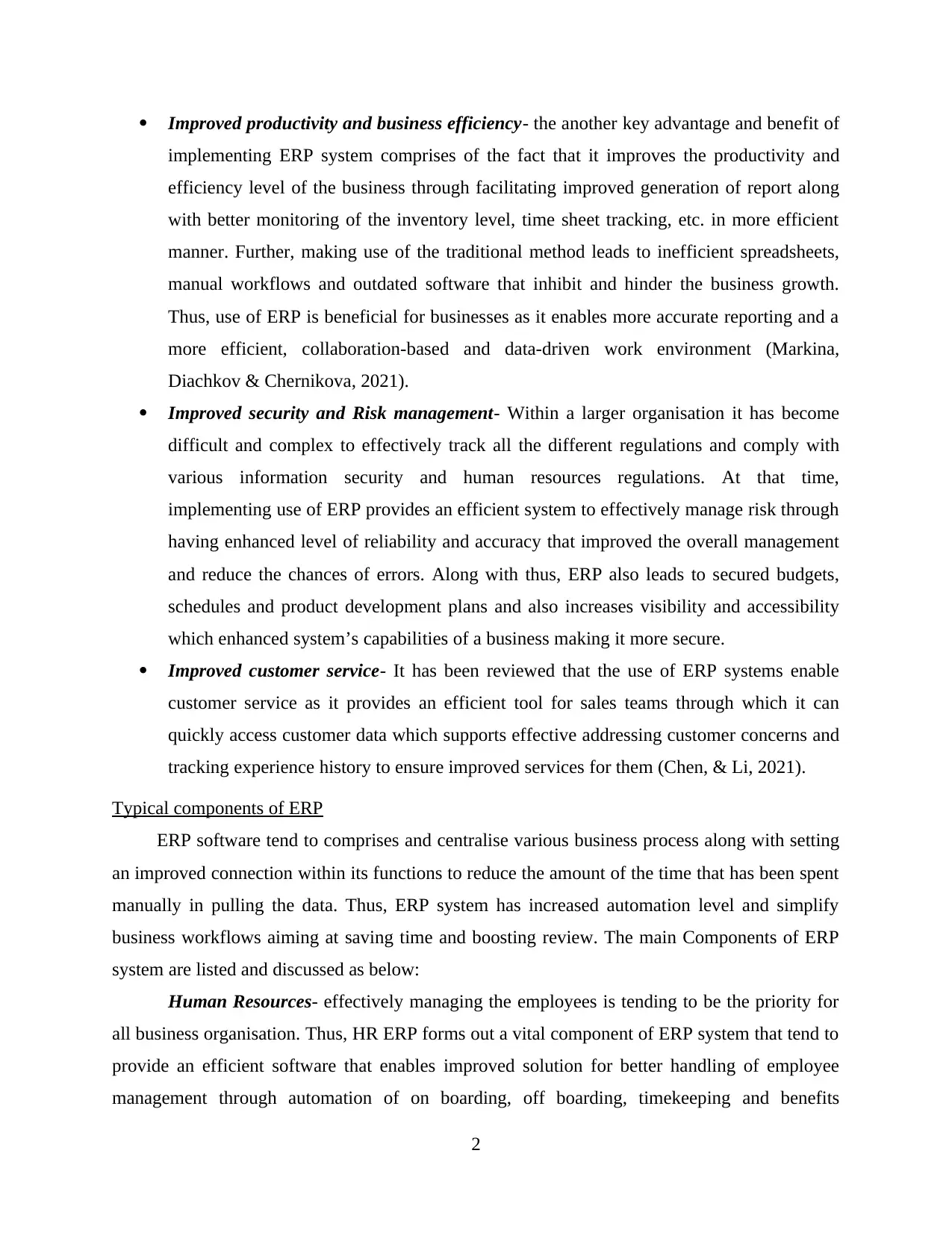
Improved productivity and business efficiency- the another key advantage and benefit of
implementing ERP system comprises of the fact that it improves the productivity and
efficiency level of the business through facilitating improved generation of report along
with better monitoring of the inventory level, time sheet tracking, etc. in more efficient
manner. Further, making use of the traditional method leads to inefficient spreadsheets,
manual workflows and outdated software that inhibit and hinder the business growth.
Thus, use of ERP is beneficial for businesses as it enables more accurate reporting and a
more efficient, collaboration-based and data-driven work environment (Markina,
Diachkov & Chernikova, 2021).
Improved security and Risk management- Within a larger organisation it has become
difficult and complex to effectively track all the different regulations and comply with
various information security and human resources regulations. At that time,
implementing use of ERP provides an efficient system to effectively manage risk through
having enhanced level of reliability and accuracy that improved the overall management
and reduce the chances of errors. Along with thus, ERP also leads to secured budgets,
schedules and product development plans and also increases visibility and accessibility
which enhanced system’s capabilities of a business making it more secure.
Improved customer service- It has been reviewed that the use of ERP systems enable
customer service as it provides an efficient tool for sales teams through which it can
quickly access customer data which supports effective addressing customer concerns and
tracking experience history to ensure improved services for them (Chen, & Li, 2021).
Typical components of ERP
ERP software tend to comprises and centralise various business process along with setting
an improved connection within its functions to reduce the amount of the time that has been spent
manually in pulling the data. Thus, ERP system has increased automation level and simplify
business workflows aiming at saving time and boosting review. The main Components of ERP
system are listed and discussed as below:
Human Resources- effectively managing the employees is tending to be the priority for
all business organisation. Thus, HR ERP forms out a vital component of ERP system that tend to
provide an efficient software that enables improved solution for better handling of employee
management through automation of on boarding, off boarding, timekeeping and benefits
2
implementing ERP system comprises of the fact that it improves the productivity and
efficiency level of the business through facilitating improved generation of report along
with better monitoring of the inventory level, time sheet tracking, etc. in more efficient
manner. Further, making use of the traditional method leads to inefficient spreadsheets,
manual workflows and outdated software that inhibit and hinder the business growth.
Thus, use of ERP is beneficial for businesses as it enables more accurate reporting and a
more efficient, collaboration-based and data-driven work environment (Markina,
Diachkov & Chernikova, 2021).
Improved security and Risk management- Within a larger organisation it has become
difficult and complex to effectively track all the different regulations and comply with
various information security and human resources regulations. At that time,
implementing use of ERP provides an efficient system to effectively manage risk through
having enhanced level of reliability and accuracy that improved the overall management
and reduce the chances of errors. Along with thus, ERP also leads to secured budgets,
schedules and product development plans and also increases visibility and accessibility
which enhanced system’s capabilities of a business making it more secure.
Improved customer service- It has been reviewed that the use of ERP systems enable
customer service as it provides an efficient tool for sales teams through which it can
quickly access customer data which supports effective addressing customer concerns and
tracking experience history to ensure improved services for them (Chen, & Li, 2021).
Typical components of ERP
ERP software tend to comprises and centralise various business process along with setting
an improved connection within its functions to reduce the amount of the time that has been spent
manually in pulling the data. Thus, ERP system has increased automation level and simplify
business workflows aiming at saving time and boosting review. The main Components of ERP
system are listed and discussed as below:
Human Resources- effectively managing the employees is tending to be the priority for
all business organisation. Thus, HR ERP forms out a vital component of ERP system that tend to
provide an efficient software that enables improved solution for better handling of employee
management through automation of on boarding, off boarding, timekeeping and benefits
2
Secure Best Marks with AI Grader
Need help grading? Try our AI Grader for instant feedback on your assignments.
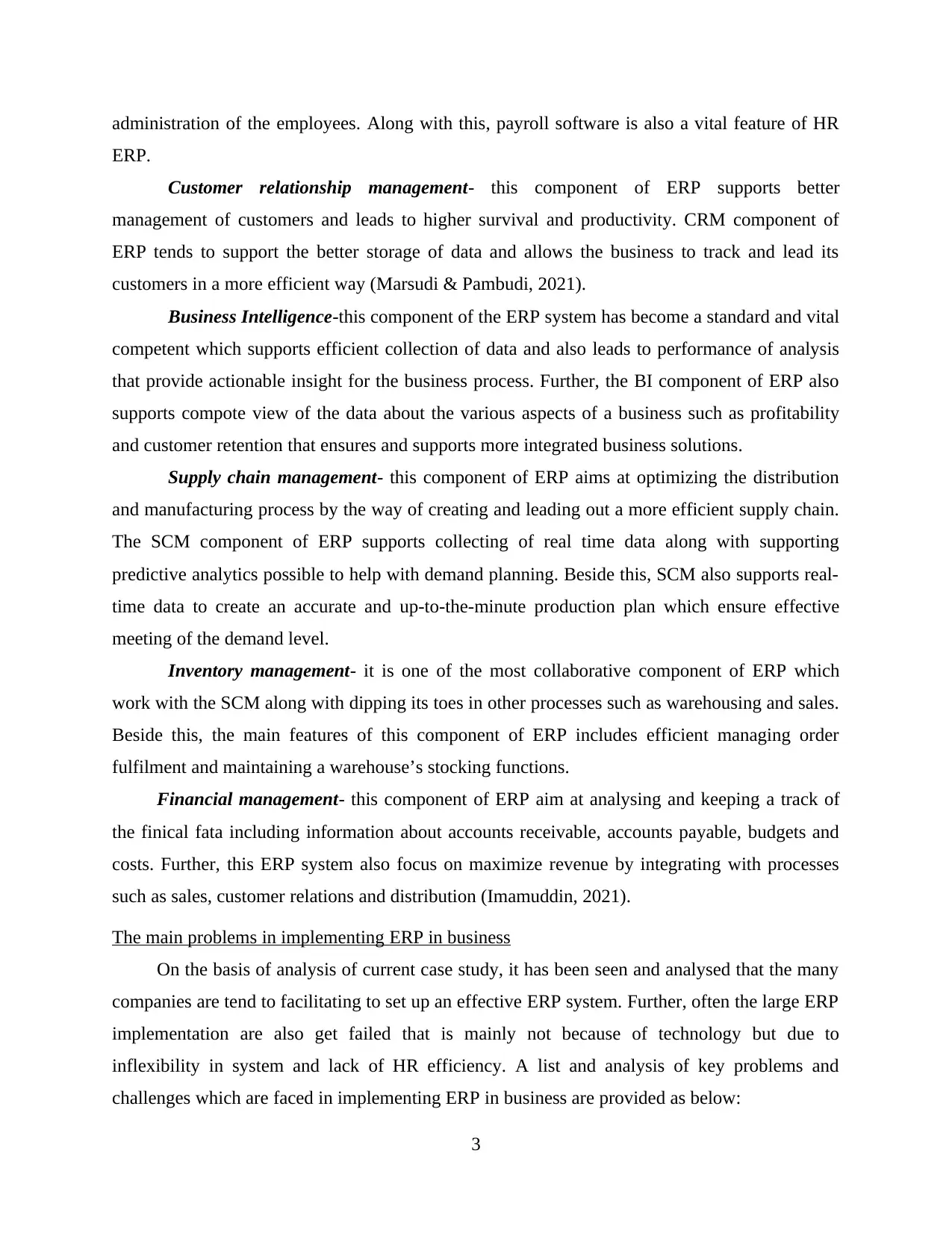
administration of the employees. Along with this, payroll software is also a vital feature of HR
ERP.
Customer relationship management- this component of ERP supports better
management of customers and leads to higher survival and productivity. CRM component of
ERP tends to support the better storage of data and allows the business to track and lead its
customers in a more efficient way (Marsudi & Pambudi, 2021).
Business Intelligence-this component of the ERP system has become a standard and vital
competent which supports efficient collection of data and also leads to performance of analysis
that provide actionable insight for the business process. Further, the BI component of ERP also
supports compote view of the data about the various aspects of a business such as profitability
and customer retention that ensures and supports more integrated business solutions.
Supply chain management- this component of ERP aims at optimizing the distribution
and manufacturing process by the way of creating and leading out a more efficient supply chain.
The SCM component of ERP supports collecting of real time data along with supporting
predictive analytics possible to help with demand planning. Beside this, SCM also supports real-
time data to create an accurate and up-to-the-minute production plan which ensure effective
meeting of the demand level.
Inventory management- it is one of the most collaborative component of ERP which
work with the SCM along with dipping its toes in other processes such as warehousing and sales.
Beside this, the main features of this component of ERP includes efficient managing order
fulfilment and maintaining a warehouse’s stocking functions.
Financial management- this component of ERP aim at analysing and keeping a track of
the finical fata including information about accounts receivable, accounts payable, budgets and
costs. Further, this ERP system also focus on maximize revenue by integrating with processes
such as sales, customer relations and distribution (Imamuddin, 2021).
The main problems in implementing ERP in business
On the basis of analysis of current case study, it has been seen and analysed that the many
companies are tend to facilitating to set up an effective ERP system. Further, often the large ERP
implementation are also get failed that is mainly not because of technology but due to
inflexibility in system and lack of HR efficiency. A list and analysis of key problems and
challenges which are faced in implementing ERP in business are provided as below:
3
ERP.
Customer relationship management- this component of ERP supports better
management of customers and leads to higher survival and productivity. CRM component of
ERP tends to support the better storage of data and allows the business to track and lead its
customers in a more efficient way (Marsudi & Pambudi, 2021).
Business Intelligence-this component of the ERP system has become a standard and vital
competent which supports efficient collection of data and also leads to performance of analysis
that provide actionable insight for the business process. Further, the BI component of ERP also
supports compote view of the data about the various aspects of a business such as profitability
and customer retention that ensures and supports more integrated business solutions.
Supply chain management- this component of ERP aims at optimizing the distribution
and manufacturing process by the way of creating and leading out a more efficient supply chain.
The SCM component of ERP supports collecting of real time data along with supporting
predictive analytics possible to help with demand planning. Beside this, SCM also supports real-
time data to create an accurate and up-to-the-minute production plan which ensure effective
meeting of the demand level.
Inventory management- it is one of the most collaborative component of ERP which
work with the SCM along with dipping its toes in other processes such as warehousing and sales.
Beside this, the main features of this component of ERP includes efficient managing order
fulfilment and maintaining a warehouse’s stocking functions.
Financial management- this component of ERP aim at analysing and keeping a track of
the finical fata including information about accounts receivable, accounts payable, budgets and
costs. Further, this ERP system also focus on maximize revenue by integrating with processes
such as sales, customer relations and distribution (Imamuddin, 2021).
The main problems in implementing ERP in business
On the basis of analysis of current case study, it has been seen and analysed that the many
companies are tend to facilitating to set up an effective ERP system. Further, often the large ERP
implementation are also get failed that is mainly not because of technology but due to
inflexibility in system and lack of HR efficiency. A list and analysis of key problems and
challenges which are faced in implementing ERP in business are provided as below:
3
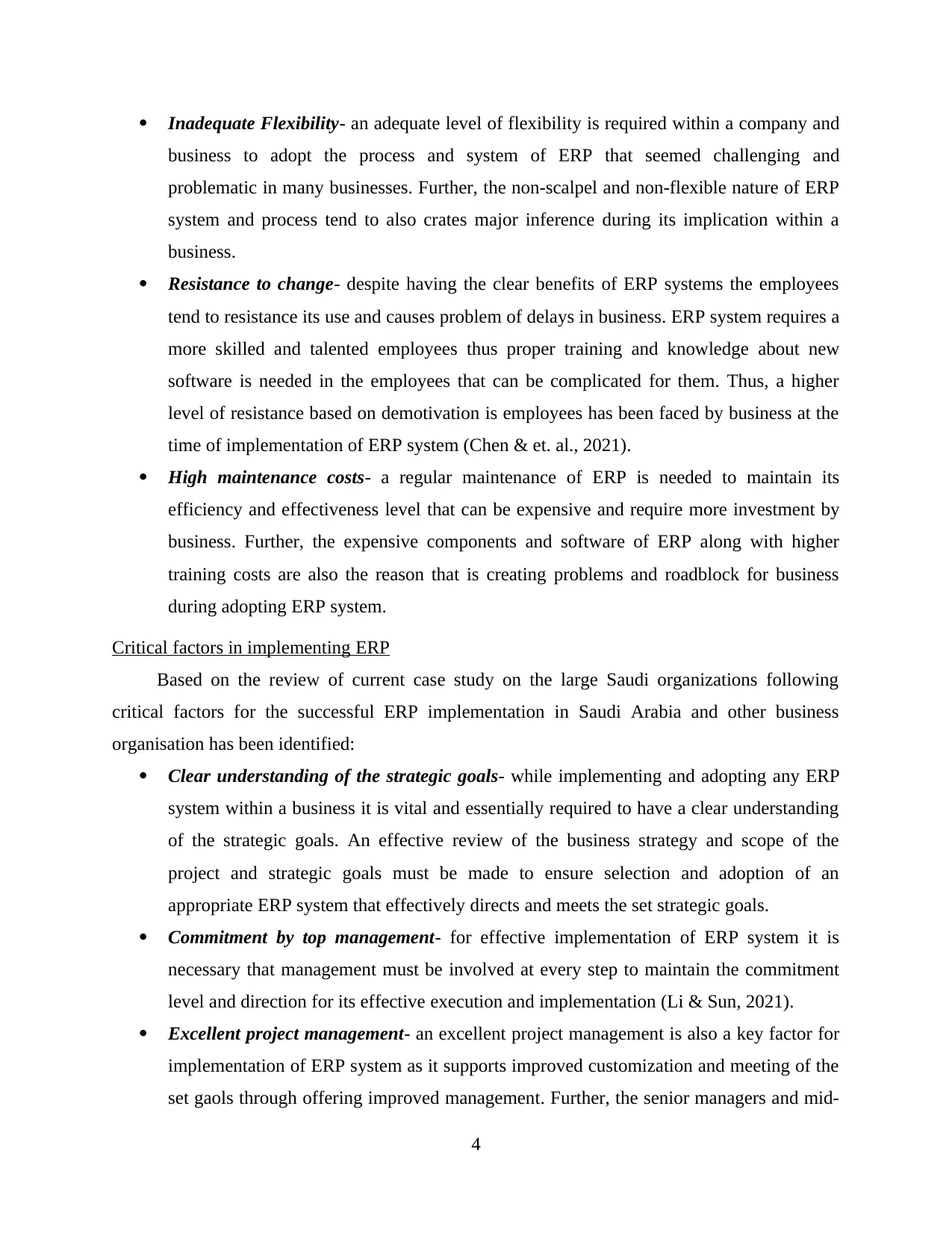
Inadequate Flexibility- an adequate level of flexibility is required within a company and
business to adopt the process and system of ERP that seemed challenging and
problematic in many businesses. Further, the non-scalpel and non-flexible nature of ERP
system and process tend to also crates major inference during its implication within a
business.
Resistance to change- despite having the clear benefits of ERP systems the employees
tend to resistance its use and causes problem of delays in business. ERP system requires a
more skilled and talented employees thus proper training and knowledge about new
software is needed in the employees that can be complicated for them. Thus, a higher
level of resistance based on demotivation is employees has been faced by business at the
time of implementation of ERP system (Chen & et. al., 2021).
High maintenance costs- a regular maintenance of ERP is needed to maintain its
efficiency and effectiveness level that can be expensive and require more investment by
business. Further, the expensive components and software of ERP along with higher
training costs are also the reason that is creating problems and roadblock for business
during adopting ERP system.
Critical factors in implementing ERP
Based on the review of current case study on the large Saudi organizations following
critical factors for the successful ERP implementation in Saudi Arabia and other business
organisation has been identified:
Clear understanding of the strategic goals- while implementing and adopting any ERP
system within a business it is vital and essentially required to have a clear understanding
of the strategic goals. An effective review of the business strategy and scope of the
project and strategic goals must be made to ensure selection and adoption of an
appropriate ERP system that effectively directs and meets the set strategic goals.
Commitment by top management- for effective implementation of ERP system it is
necessary that management must be involved at every step to maintain the commitment
level and direction for its effective execution and implementation (Li & Sun, 2021).
Excellent project management- an excellent project management is also a key factor for
implementation of ERP system as it supports improved customization and meeting of the
set gaols through offering improved management. Further, the senior managers and mid-
4
business to adopt the process and system of ERP that seemed challenging and
problematic in many businesses. Further, the non-scalpel and non-flexible nature of ERP
system and process tend to also crates major inference during its implication within a
business.
Resistance to change- despite having the clear benefits of ERP systems the employees
tend to resistance its use and causes problem of delays in business. ERP system requires a
more skilled and talented employees thus proper training and knowledge about new
software is needed in the employees that can be complicated for them. Thus, a higher
level of resistance based on demotivation is employees has been faced by business at the
time of implementation of ERP system (Chen & et. al., 2021).
High maintenance costs- a regular maintenance of ERP is needed to maintain its
efficiency and effectiveness level that can be expensive and require more investment by
business. Further, the expensive components and software of ERP along with higher
training costs are also the reason that is creating problems and roadblock for business
during adopting ERP system.
Critical factors in implementing ERP
Based on the review of current case study on the large Saudi organizations following
critical factors for the successful ERP implementation in Saudi Arabia and other business
organisation has been identified:
Clear understanding of the strategic goals- while implementing and adopting any ERP
system within a business it is vital and essentially required to have a clear understanding
of the strategic goals. An effective review of the business strategy and scope of the
project and strategic goals must be made to ensure selection and adoption of an
appropriate ERP system that effectively directs and meets the set strategic goals.
Commitment by top management- for effective implementation of ERP system it is
necessary that management must be involved at every step to maintain the commitment
level and direction for its effective execution and implementation (Li & Sun, 2021).
Excellent project management- an excellent project management is also a key factor for
implementation of ERP system as it supports improved customization and meeting of the
set gaols through offering improved management. Further, the senior managers and mid-
4
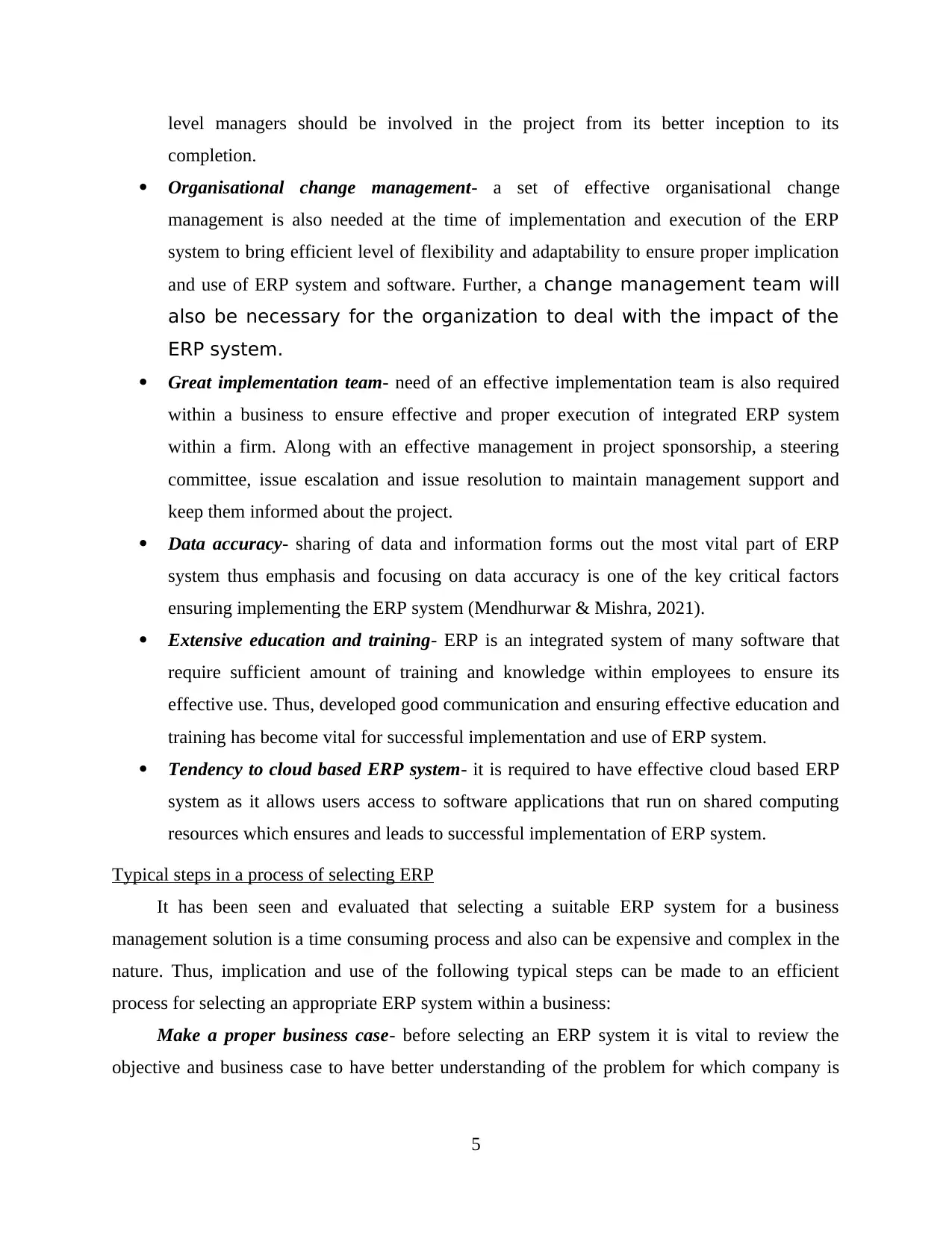
level managers should be involved in the project from its better inception to its
completion.
Organisational change management- a set of effective organisational change
management is also needed at the time of implementation and execution of the ERP
system to bring efficient level of flexibility and adaptability to ensure proper implication
and use of ERP system and software. Further, a change management team will
also be necessary for the organization to deal with the impact of the
ERP system.
Great implementation team- need of an effective implementation team is also required
within a business to ensure effective and proper execution of integrated ERP system
within a firm. Along with an effective management in project sponsorship, a steering
committee, issue escalation and issue resolution to maintain management support and
keep them informed about the project.
Data accuracy- sharing of data and information forms out the most vital part of ERP
system thus emphasis and focusing on data accuracy is one of the key critical factors
ensuring implementing the ERP system (Mendhurwar & Mishra, 2021).
Extensive education and training- ERP is an integrated system of many software that
require sufficient amount of training and knowledge within employees to ensure its
effective use. Thus, developed good communication and ensuring effective education and
training has become vital for successful implementation and use of ERP system.
Tendency to cloud based ERP system- it is required to have effective cloud based ERP
system as it allows users access to software applications that run on shared computing
resources which ensures and leads to successful implementation of ERP system.
Typical steps in a process of selecting ERP
It has been seen and evaluated that selecting a suitable ERP system for a business
management solution is a time consuming process and also can be expensive and complex in the
nature. Thus, implication and use of the following typical steps can be made to an efficient
process for selecting an appropriate ERP system within a business:
Make a proper business case- before selecting an ERP system it is vital to review the
objective and business case to have better understanding of the problem for which company is
5
completion.
Organisational change management- a set of effective organisational change
management is also needed at the time of implementation and execution of the ERP
system to bring efficient level of flexibility and adaptability to ensure proper implication
and use of ERP system and software. Further, a change management team will
also be necessary for the organization to deal with the impact of the
ERP system.
Great implementation team- need of an effective implementation team is also required
within a business to ensure effective and proper execution of integrated ERP system
within a firm. Along with an effective management in project sponsorship, a steering
committee, issue escalation and issue resolution to maintain management support and
keep them informed about the project.
Data accuracy- sharing of data and information forms out the most vital part of ERP
system thus emphasis and focusing on data accuracy is one of the key critical factors
ensuring implementing the ERP system (Mendhurwar & Mishra, 2021).
Extensive education and training- ERP is an integrated system of many software that
require sufficient amount of training and knowledge within employees to ensure its
effective use. Thus, developed good communication and ensuring effective education and
training has become vital for successful implementation and use of ERP system.
Tendency to cloud based ERP system- it is required to have effective cloud based ERP
system as it allows users access to software applications that run on shared computing
resources which ensures and leads to successful implementation of ERP system.
Typical steps in a process of selecting ERP
It has been seen and evaluated that selecting a suitable ERP system for a business
management solution is a time consuming process and also can be expensive and complex in the
nature. Thus, implication and use of the following typical steps can be made to an efficient
process for selecting an appropriate ERP system within a business:
Make a proper business case- before selecting an ERP system it is vital to review the
objective and business case to have better understanding of the problem for which company is
5
Paraphrase This Document
Need a fresh take? Get an instant paraphrase of this document with our AI Paraphraser
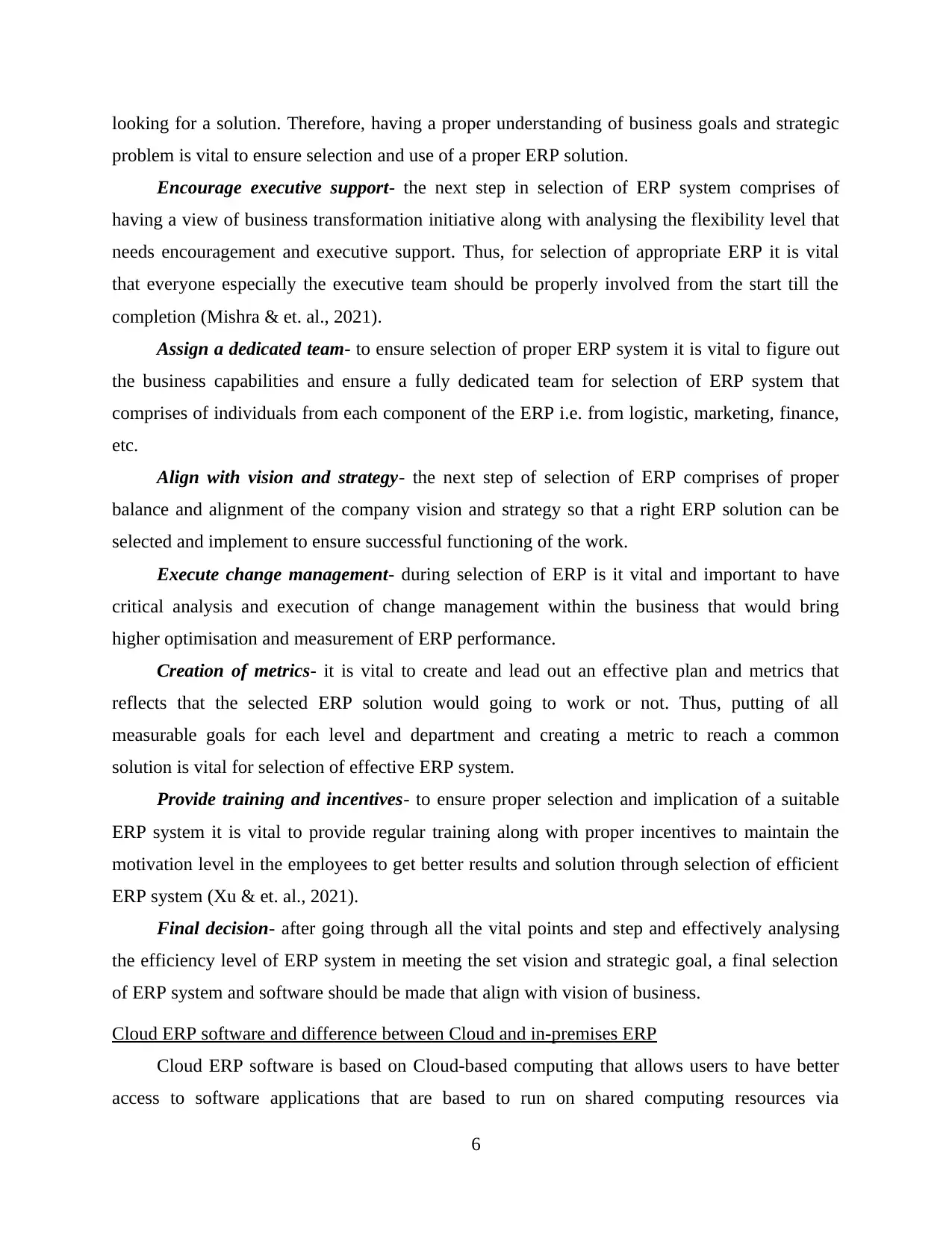
looking for a solution. Therefore, having a proper understanding of business goals and strategic
problem is vital to ensure selection and use of a proper ERP solution.
Encourage executive support- the next step in selection of ERP system comprises of
having a view of business transformation initiative along with analysing the flexibility level that
needs encouragement and executive support. Thus, for selection of appropriate ERP it is vital
that everyone especially the executive team should be properly involved from the start till the
completion (Mishra & et. al., 2021).
Assign a dedicated team- to ensure selection of proper ERP system it is vital to figure out
the business capabilities and ensure a fully dedicated team for selection of ERP system that
comprises of individuals from each component of the ERP i.e. from logistic, marketing, finance,
etc.
Align with vision and strategy- the next step of selection of ERP comprises of proper
balance and alignment of the company vision and strategy so that a right ERP solution can be
selected and implement to ensure successful functioning of the work.
Execute change management- during selection of ERP is it vital and important to have
critical analysis and execution of change management within the business that would bring
higher optimisation and measurement of ERP performance.
Creation of metrics- it is vital to create and lead out an effective plan and metrics that
reflects that the selected ERP solution would going to work or not. Thus, putting of all
measurable goals for each level and department and creating a metric to reach a common
solution is vital for selection of effective ERP system.
Provide training and incentives- to ensure proper selection and implication of a suitable
ERP system it is vital to provide regular training along with proper incentives to maintain the
motivation level in the employees to get better results and solution through selection of efficient
ERP system (Xu & et. al., 2021).
Final decision- after going through all the vital points and step and effectively analysing
the efficiency level of ERP system in meeting the set vision and strategic goal, a final selection
of ERP system and software should be made that align with vision of business.
Cloud ERP software and difference between Cloud and in-premises ERP
Cloud ERP software is based on Cloud-based computing that allows users to have better
access to software applications that are based to run on shared computing resources via
6
problem is vital to ensure selection and use of a proper ERP solution.
Encourage executive support- the next step in selection of ERP system comprises of
having a view of business transformation initiative along with analysing the flexibility level that
needs encouragement and executive support. Thus, for selection of appropriate ERP it is vital
that everyone especially the executive team should be properly involved from the start till the
completion (Mishra & et. al., 2021).
Assign a dedicated team- to ensure selection of proper ERP system it is vital to figure out
the business capabilities and ensure a fully dedicated team for selection of ERP system that
comprises of individuals from each component of the ERP i.e. from logistic, marketing, finance,
etc.
Align with vision and strategy- the next step of selection of ERP comprises of proper
balance and alignment of the company vision and strategy so that a right ERP solution can be
selected and implement to ensure successful functioning of the work.
Execute change management- during selection of ERP is it vital and important to have
critical analysis and execution of change management within the business that would bring
higher optimisation and measurement of ERP performance.
Creation of metrics- it is vital to create and lead out an effective plan and metrics that
reflects that the selected ERP solution would going to work or not. Thus, putting of all
measurable goals for each level and department and creating a metric to reach a common
solution is vital for selection of effective ERP system.
Provide training and incentives- to ensure proper selection and implication of a suitable
ERP system it is vital to provide regular training along with proper incentives to maintain the
motivation level in the employees to get better results and solution through selection of efficient
ERP system (Xu & et. al., 2021).
Final decision- after going through all the vital points and step and effectively analysing
the efficiency level of ERP system in meeting the set vision and strategic goal, a final selection
of ERP system and software should be made that align with vision of business.
Cloud ERP software and difference between Cloud and in-premises ERP
Cloud ERP software is based on Cloud-based computing that allows users to have better
access to software applications that are based to run on shared computing resources via
6
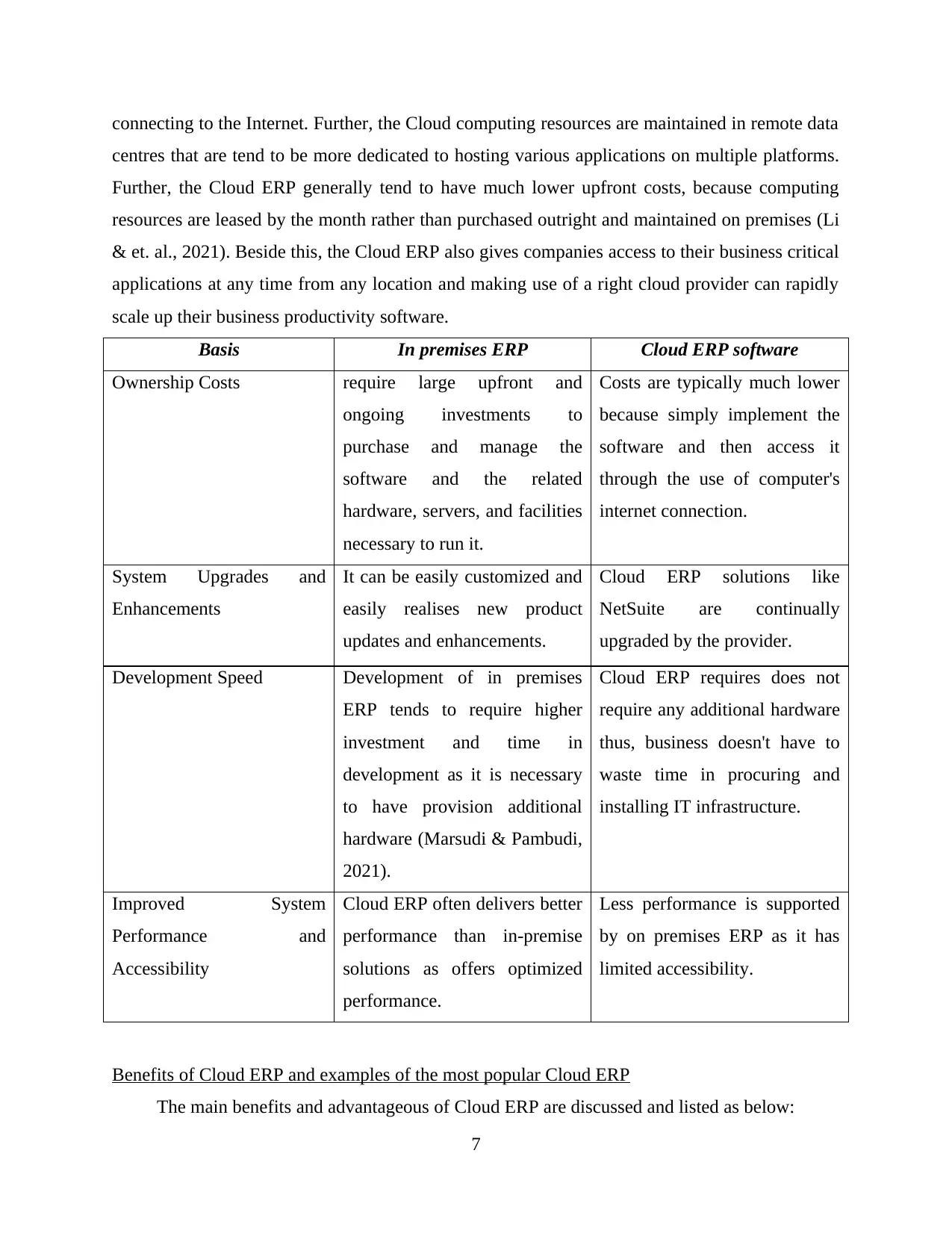
connecting to the Internet. Further, the Cloud computing resources are maintained in remote data
centres that are tend to be more dedicated to hosting various applications on multiple platforms.
Further, the Cloud ERP generally tend to have much lower upfront costs, because computing
resources are leased by the month rather than purchased outright and maintained on premises (Li
& et. al., 2021). Beside this, the Cloud ERP also gives companies access to their business critical
applications at any time from any location and making use of a right cloud provider can rapidly
scale up their business productivity software.
Basis In premises ERP Cloud ERP software
Ownership Costs require large upfront and
ongoing investments to
purchase and manage the
software and the related
hardware, servers, and facilities
necessary to run it.
Costs are typically much lower
because simply implement the
software and then access it
through the use of computer's
internet connection.
System Upgrades and
Enhancements
It can be easily customized and
easily realises new product
updates and enhancements.
Cloud ERP solutions like
NetSuite are continually
upgraded by the provider.
Development Speed Development of in premises
ERP tends to require higher
investment and time in
development as it is necessary
to have provision additional
hardware (Marsudi & Pambudi,
2021).
Cloud ERP requires does not
require any additional hardware
thus, business doesn't have to
waste time in procuring and
installing IT infrastructure.
Improved System
Performance and
Accessibility
Cloud ERP often delivers better
performance than in-premise
solutions as offers optimized
performance.
Less performance is supported
by on premises ERP as it has
limited accessibility.
Benefits of Cloud ERP and examples of the most popular Cloud ERP
The main benefits and advantageous of Cloud ERP are discussed and listed as below:
7
centres that are tend to be more dedicated to hosting various applications on multiple platforms.
Further, the Cloud ERP generally tend to have much lower upfront costs, because computing
resources are leased by the month rather than purchased outright and maintained on premises (Li
& et. al., 2021). Beside this, the Cloud ERP also gives companies access to their business critical
applications at any time from any location and making use of a right cloud provider can rapidly
scale up their business productivity software.
Basis In premises ERP Cloud ERP software
Ownership Costs require large upfront and
ongoing investments to
purchase and manage the
software and the related
hardware, servers, and facilities
necessary to run it.
Costs are typically much lower
because simply implement the
software and then access it
through the use of computer's
internet connection.
System Upgrades and
Enhancements
It can be easily customized and
easily realises new product
updates and enhancements.
Cloud ERP solutions like
NetSuite are continually
upgraded by the provider.
Development Speed Development of in premises
ERP tends to require higher
investment and time in
development as it is necessary
to have provision additional
hardware (Marsudi & Pambudi,
2021).
Cloud ERP requires does not
require any additional hardware
thus, business doesn't have to
waste time in procuring and
installing IT infrastructure.
Improved System
Performance and
Accessibility
Cloud ERP often delivers better
performance than in-premise
solutions as offers optimized
performance.
Less performance is supported
by on premises ERP as it has
limited accessibility.
Benefits of Cloud ERP and examples of the most popular Cloud ERP
The main benefits and advantageous of Cloud ERP are discussed and listed as below:
7
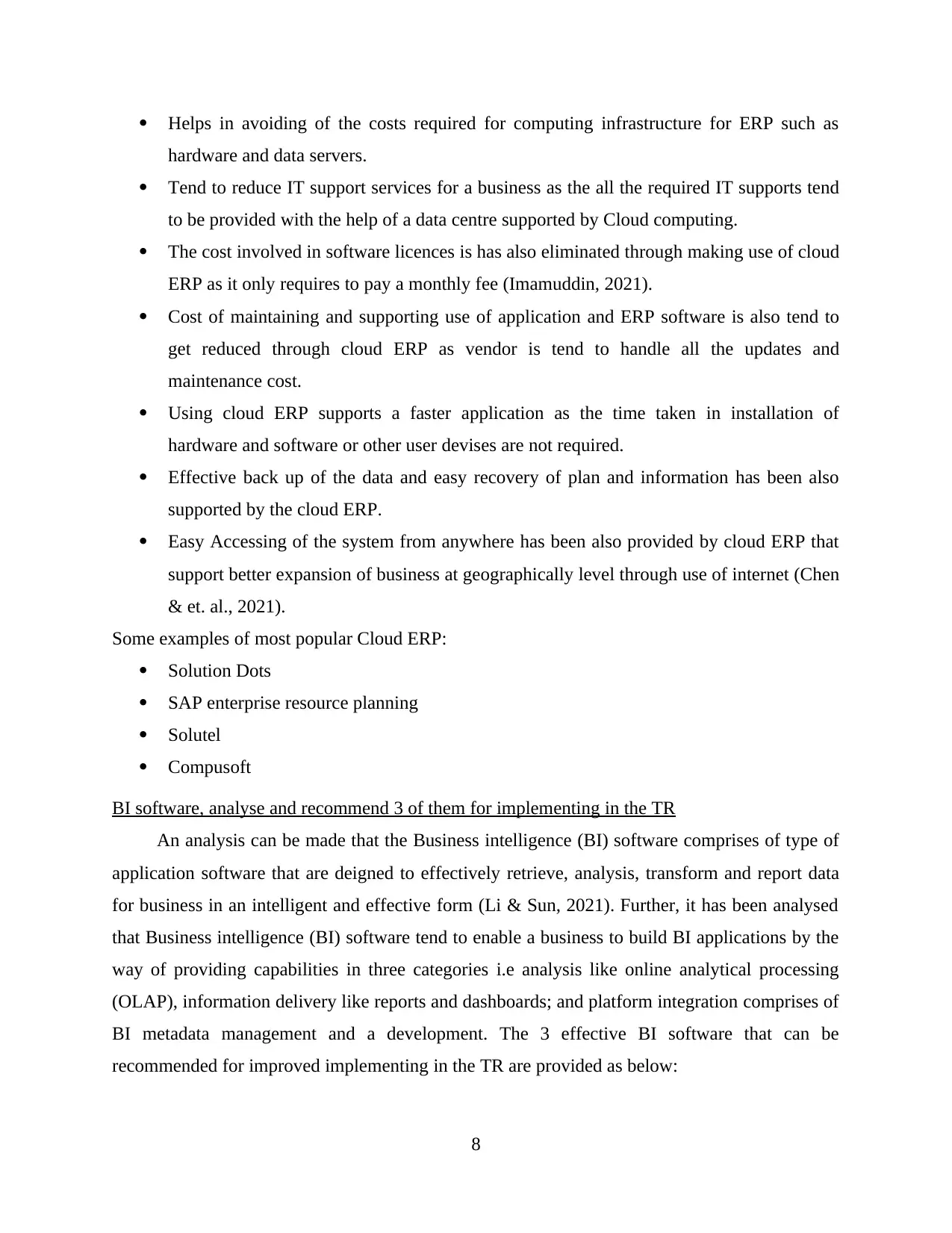
Helps in avoiding of the costs required for computing infrastructure for ERP such as
hardware and data servers.
Tend to reduce IT support services for a business as the all the required IT supports tend
to be provided with the help of a data centre supported by Cloud computing.
The cost involved in software licences is has also eliminated through making use of cloud
ERP as it only requires to pay a monthly fee (Imamuddin, 2021).
Cost of maintaining and supporting use of application and ERP software is also tend to
get reduced through cloud ERP as vendor is tend to handle all the updates and
maintenance cost.
Using cloud ERP supports a faster application as the time taken in installation of
hardware and software or other user devises are not required.
Effective back up of the data and easy recovery of plan and information has been also
supported by the cloud ERP.
Easy Accessing of the system from anywhere has been also provided by cloud ERP that
support better expansion of business at geographically level through use of internet (Chen
& et. al., 2021).
Some examples of most popular Cloud ERP:
Solution Dots
SAP enterprise resource planning
Solutel
Compusoft
BI software, analyse and recommend 3 of them for implementing in the TR
An analysis can be made that the Business intelligence (BI) software comprises of type of
application software that are deigned to effectively retrieve, analysis, transform and report data
for business in an intelligent and effective form (Li & Sun, 2021). Further, it has been analysed
that Business intelligence (BI) software tend to enable a business to build BI applications by the
way of providing capabilities in three categories i.e analysis like online analytical processing
(OLAP), information delivery like reports and dashboards; and platform integration comprises of
BI metadata management and a development. The 3 effective BI software that can be
recommended for improved implementing in the TR are provided as below:
8
hardware and data servers.
Tend to reduce IT support services for a business as the all the required IT supports tend
to be provided with the help of a data centre supported by Cloud computing.
The cost involved in software licences is has also eliminated through making use of cloud
ERP as it only requires to pay a monthly fee (Imamuddin, 2021).
Cost of maintaining and supporting use of application and ERP software is also tend to
get reduced through cloud ERP as vendor is tend to handle all the updates and
maintenance cost.
Using cloud ERP supports a faster application as the time taken in installation of
hardware and software or other user devises are not required.
Effective back up of the data and easy recovery of plan and information has been also
supported by the cloud ERP.
Easy Accessing of the system from anywhere has been also provided by cloud ERP that
support better expansion of business at geographically level through use of internet (Chen
& et. al., 2021).
Some examples of most popular Cloud ERP:
Solution Dots
SAP enterprise resource planning
Solutel
Compusoft
BI software, analyse and recommend 3 of them for implementing in the TR
An analysis can be made that the Business intelligence (BI) software comprises of type of
application software that are deigned to effectively retrieve, analysis, transform and report data
for business in an intelligent and effective form (Li & Sun, 2021). Further, it has been analysed
that Business intelligence (BI) software tend to enable a business to build BI applications by the
way of providing capabilities in three categories i.e analysis like online analytical processing
(OLAP), information delivery like reports and dashboards; and platform integration comprises of
BI metadata management and a development. The 3 effective BI software that can be
recommended for improved implementing in the TR are provided as below:
8
Secure Best Marks with AI Grader
Need help grading? Try our AI Grader for instant feedback on your assignments.
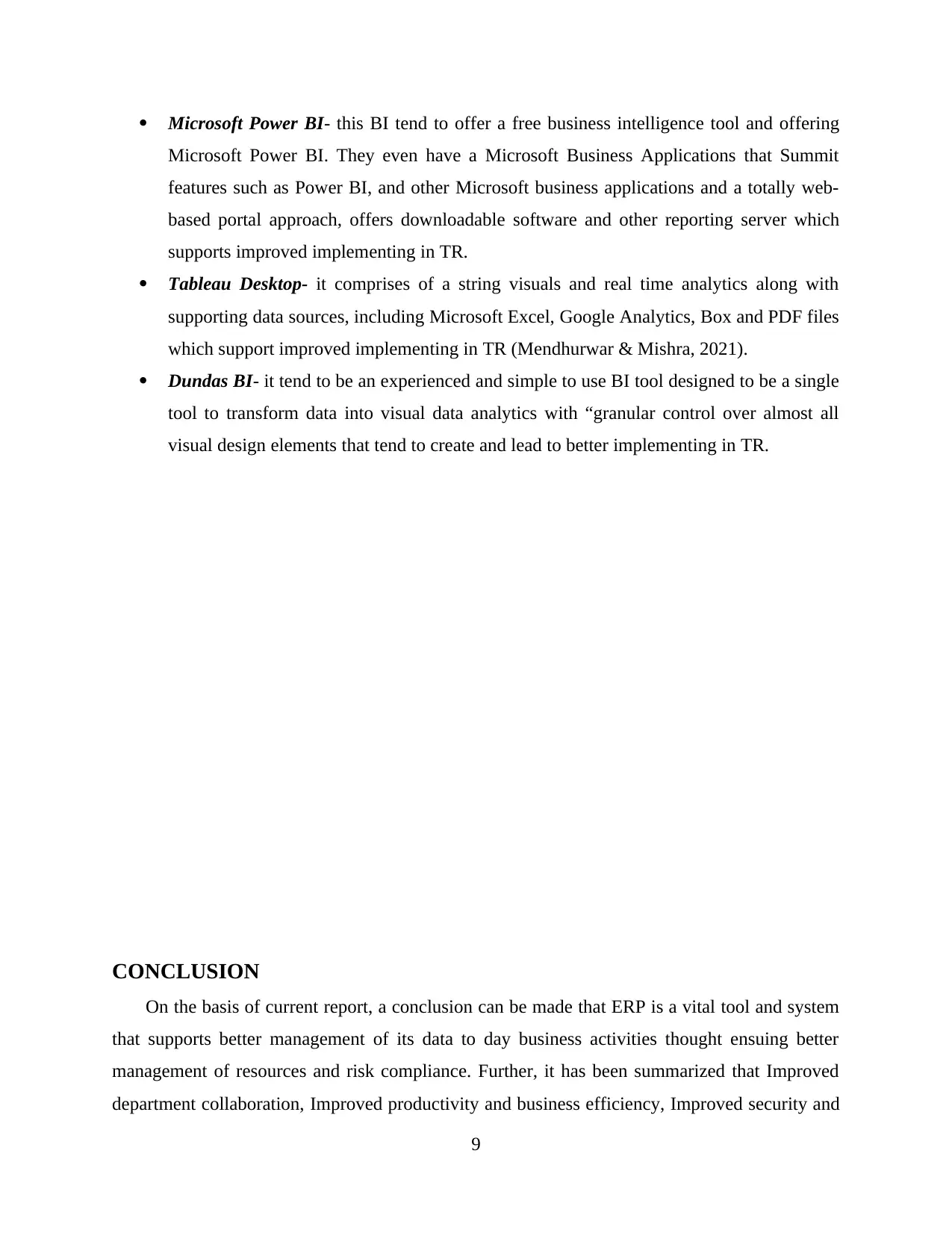
Microsoft Power BI- this BI tend to offer a free business intelligence tool and offering
Microsoft Power BI. They even have a Microsoft Business Applications that Summit
features such as Power BI, and other Microsoft business applications and a totally web-
based portal approach, offers downloadable software and other reporting server which
supports improved implementing in TR.
Tableau Desktop- it comprises of a string visuals and real time analytics along with
supporting data sources, including Microsoft Excel, Google Analytics, Box and PDF files
which support improved implementing in TR (Mendhurwar & Mishra, 2021).
Dundas BI- it tend to be an experienced and simple to use BI tool designed to be a single
tool to transform data into visual data analytics with “granular control over almost all
visual design elements that tend to create and lead to better implementing in TR.
CONCLUSION
On the basis of current report, a conclusion can be made that ERP is a vital tool and system
that supports better management of its data to day business activities thought ensuing better
management of resources and risk compliance. Further, it has been summarized that Improved
department collaboration, Improved productivity and business efficiency, Improved security and
9
Microsoft Power BI. They even have a Microsoft Business Applications that Summit
features such as Power BI, and other Microsoft business applications and a totally web-
based portal approach, offers downloadable software and other reporting server which
supports improved implementing in TR.
Tableau Desktop- it comprises of a string visuals and real time analytics along with
supporting data sources, including Microsoft Excel, Google Analytics, Box and PDF files
which support improved implementing in TR (Mendhurwar & Mishra, 2021).
Dundas BI- it tend to be an experienced and simple to use BI tool designed to be a single
tool to transform data into visual data analytics with “granular control over almost all
visual design elements that tend to create and lead to better implementing in TR.
CONCLUSION
On the basis of current report, a conclusion can be made that ERP is a vital tool and system
that supports better management of its data to day business activities thought ensuing better
management of resources and risk compliance. Further, it has been summarized that Improved
department collaboration, Improved productivity and business efficiency, Improved security and
9
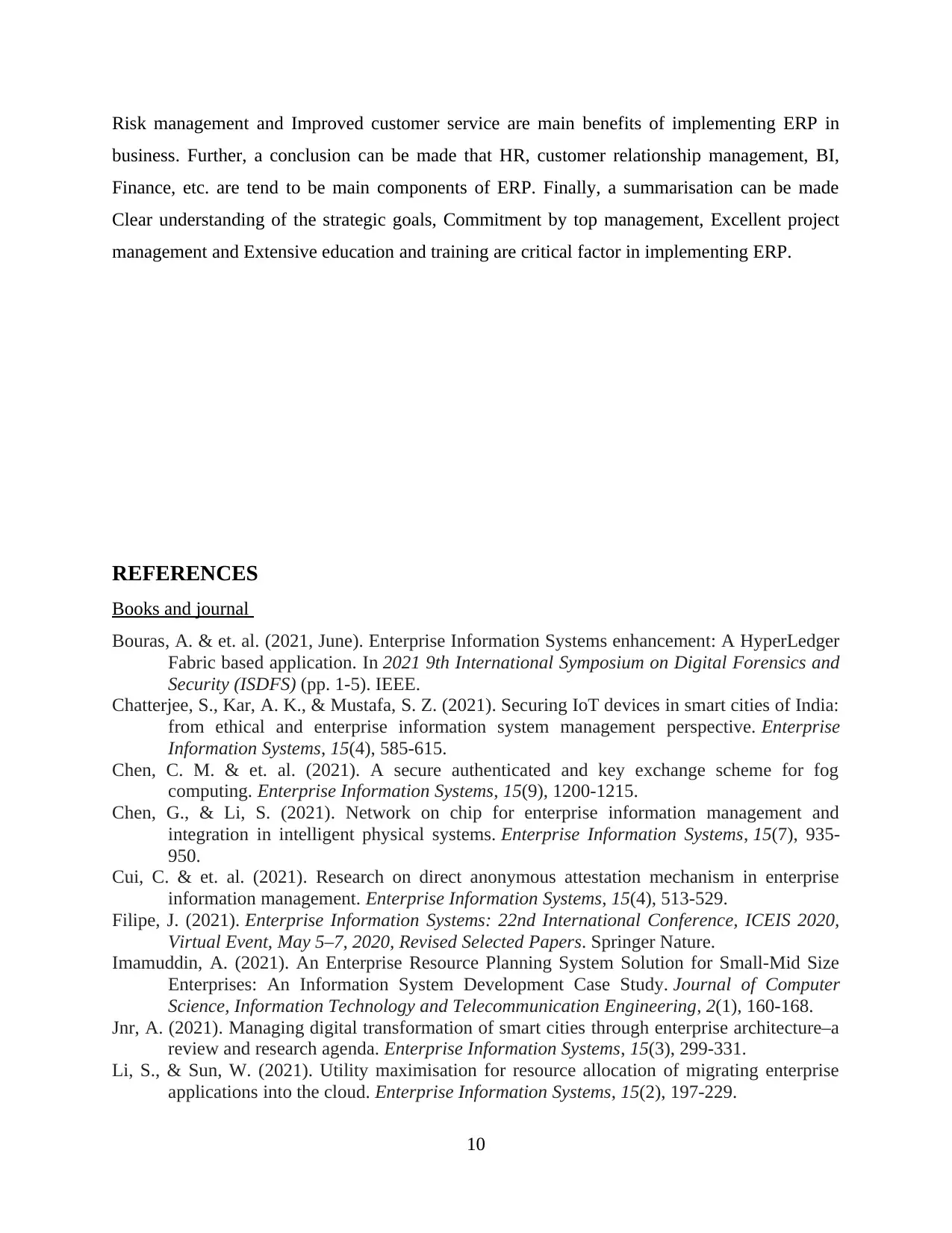
Risk management and Improved customer service are main benefits of implementing ERP in
business. Further, a conclusion can be made that HR, customer relationship management, BI,
Finance, etc. are tend to be main components of ERP. Finally, a summarisation can be made
Clear understanding of the strategic goals, Commitment by top management, Excellent project
management and Extensive education and training are critical factor in implementing ERP.
REFERENCES
Books and journal
Bouras, A. & et. al. (2021, June). Enterprise Information Systems enhancement: A HyperLedger
Fabric based application. In 2021 9th International Symposium on Digital Forensics and
Security (ISDFS) (pp. 1-5). IEEE.
Chatterjee, S., Kar, A. K., & Mustafa, S. Z. (2021). Securing IoT devices in smart cities of India:
from ethical and enterprise information system management perspective. Enterprise
Information Systems, 15(4), 585-615.
Chen, C. M. & et. al. (2021). A secure authenticated and key exchange scheme for fog
computing. Enterprise Information Systems, 15(9), 1200-1215.
Chen, G., & Li, S. (2021). Network on chip for enterprise information management and
integration in intelligent physical systems. Enterprise Information Systems, 15(7), 935-
950.
Cui, C. & et. al. (2021). Research on direct anonymous attestation mechanism in enterprise
information management. Enterprise Information Systems, 15(4), 513-529.
Filipe, J. (2021). Enterprise Information Systems: 22nd International Conference, ICEIS 2020,
Virtual Event, May 5–7, 2020, Revised Selected Papers. Springer Nature.
Imamuddin, A. (2021). An Enterprise Resource Planning System Solution for Small-Mid Size
Enterprises: An Information System Development Case Study. Journal of Computer
Science, Information Technology and Telecommunication Engineering, 2(1), 160-168.
Jnr, A. (2021). Managing digital transformation of smart cities through enterprise architecture–a
review and research agenda. Enterprise Information Systems, 15(3), 299-331.
Li, S., & Sun, W. (2021). Utility maximisation for resource allocation of migrating enterprise
applications into the cloud. Enterprise Information Systems, 15(2), 197-229.
10
business. Further, a conclusion can be made that HR, customer relationship management, BI,
Finance, etc. are tend to be main components of ERP. Finally, a summarisation can be made
Clear understanding of the strategic goals, Commitment by top management, Excellent project
management and Extensive education and training are critical factor in implementing ERP.
REFERENCES
Books and journal
Bouras, A. & et. al. (2021, June). Enterprise Information Systems enhancement: A HyperLedger
Fabric based application. In 2021 9th International Symposium on Digital Forensics and
Security (ISDFS) (pp. 1-5). IEEE.
Chatterjee, S., Kar, A. K., & Mustafa, S. Z. (2021). Securing IoT devices in smart cities of India:
from ethical and enterprise information system management perspective. Enterprise
Information Systems, 15(4), 585-615.
Chen, C. M. & et. al. (2021). A secure authenticated and key exchange scheme for fog
computing. Enterprise Information Systems, 15(9), 1200-1215.
Chen, G., & Li, S. (2021). Network on chip for enterprise information management and
integration in intelligent physical systems. Enterprise Information Systems, 15(7), 935-
950.
Cui, C. & et. al. (2021). Research on direct anonymous attestation mechanism in enterprise
information management. Enterprise Information Systems, 15(4), 513-529.
Filipe, J. (2021). Enterprise Information Systems: 22nd International Conference, ICEIS 2020,
Virtual Event, May 5–7, 2020, Revised Selected Papers. Springer Nature.
Imamuddin, A. (2021). An Enterprise Resource Planning System Solution for Small-Mid Size
Enterprises: An Information System Development Case Study. Journal of Computer
Science, Information Technology and Telecommunication Engineering, 2(1), 160-168.
Jnr, A. (2021). Managing digital transformation of smart cities through enterprise architecture–a
review and research agenda. Enterprise Information Systems, 15(3), 299-331.
Li, S., & Sun, W. (2021). Utility maximisation for resource allocation of migrating enterprise
applications into the cloud. Enterprise Information Systems, 15(2), 197-229.
10
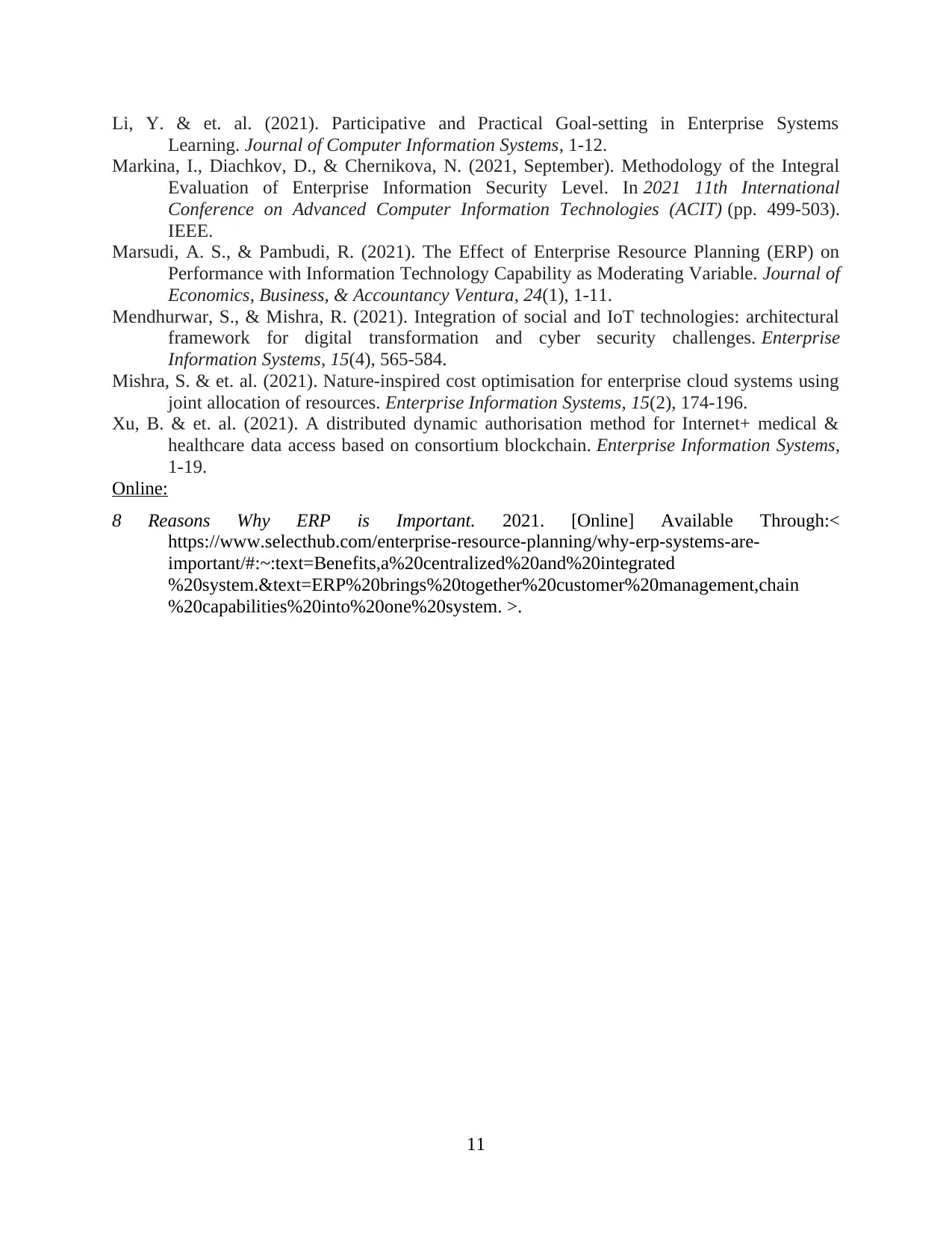
Li, Y. & et. al. (2021). Participative and Practical Goal-setting in Enterprise Systems
Learning. Journal of Computer Information Systems, 1-12.
Markina, I., Diachkov, D., & Chernikova, N. (2021, September). Methodology of the Integral
Evaluation of Enterprise Information Security Level. In 2021 11th International
Conference on Advanced Computer Information Technologies (ACIT) (pp. 499-503).
IEEE.
Marsudi, A. S., & Pambudi, R. (2021). The Effect of Enterprise Resource Planning (ERP) on
Performance with Information Technology Capability as Moderating Variable. Journal of
Economics, Business, & Accountancy Ventura, 24(1), 1-11.
Mendhurwar, S., & Mishra, R. (2021). Integration of social and IoT technologies: architectural
framework for digital transformation and cyber security challenges. Enterprise
Information Systems, 15(4), 565-584.
Mishra, S. & et. al. (2021). Nature-inspired cost optimisation for enterprise cloud systems using
joint allocation of resources. Enterprise Information Systems, 15(2), 174-196.
Xu, B. & et. al. (2021). A distributed dynamic authorisation method for Internet+ medical &
healthcare data access based on consortium blockchain. Enterprise Information Systems,
1-19.
Online:
8 Reasons Why ERP is Important. 2021. [Online] Available Through:<
https://www.selecthub.com/enterprise-resource-planning/why-erp-systems-are-
important/#:~:text=Benefits,a%20centralized%20and%20integrated
%20system.&text=ERP%20brings%20together%20customer%20management,chain
%20capabilities%20into%20one%20system. >.
11
Learning. Journal of Computer Information Systems, 1-12.
Markina, I., Diachkov, D., & Chernikova, N. (2021, September). Methodology of the Integral
Evaluation of Enterprise Information Security Level. In 2021 11th International
Conference on Advanced Computer Information Technologies (ACIT) (pp. 499-503).
IEEE.
Marsudi, A. S., & Pambudi, R. (2021). The Effect of Enterprise Resource Planning (ERP) on
Performance with Information Technology Capability as Moderating Variable. Journal of
Economics, Business, & Accountancy Ventura, 24(1), 1-11.
Mendhurwar, S., & Mishra, R. (2021). Integration of social and IoT technologies: architectural
framework for digital transformation and cyber security challenges. Enterprise
Information Systems, 15(4), 565-584.
Mishra, S. & et. al. (2021). Nature-inspired cost optimisation for enterprise cloud systems using
joint allocation of resources. Enterprise Information Systems, 15(2), 174-196.
Xu, B. & et. al. (2021). A distributed dynamic authorisation method for Internet+ medical &
healthcare data access based on consortium blockchain. Enterprise Information Systems,
1-19.
Online:
8 Reasons Why ERP is Important. 2021. [Online] Available Through:<
https://www.selecthub.com/enterprise-resource-planning/why-erp-systems-are-
important/#:~:text=Benefits,a%20centralized%20and%20integrated
%20system.&text=ERP%20brings%20together%20customer%20management,chain
%20capabilities%20into%20one%20system. >.
11
1 out of 13
Related Documents
Your All-in-One AI-Powered Toolkit for Academic Success.
+13062052269
info@desklib.com
Available 24*7 on WhatsApp / Email
![[object Object]](/_next/static/media/star-bottom.7253800d.svg)
Unlock your academic potential
© 2024 | Zucol Services PVT LTD | All rights reserved.




